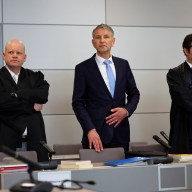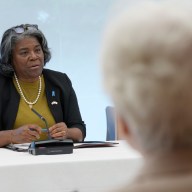MONTREAL – They’ve got bands named Vote Hezbollah and Secret Trial Five. They’re Iranian-Texans, Vancouver-based lesbian Pakistanis and the converted son of a white supremacist wife-beater. They pump their fists into the air and chant “Allahu Akbar!”
And they’re punk Muslims.
Huh?
That was Omar Majeed’s reaction, too. He’s a Montreal-based filmmaker and his new film “Taqwacore: The Birth of Punk Islam” hits theatres in Montreal and Toronto this week after runs at film festivals in Vancouver and Montreal.
“It kind of blew my mind,” he said of his discovery of the sub-culture. “I kept thinking to myself, ‘Wow, if I’d only known about this when I was a teenager. What an effect it would have had on me.”‘
Majeed discovered the scene as he pondered what it meant to be a Muslim in the wake of the Sept. 11, 2001, terrorist attacks in the United States.
He wanted to hear from different voices than the Muslim fundamentalists often seen in the media or the “mainstream Muslim organizations that were basically just saying, ‘Muslim is all good, peace and love’ and all that stuff.”
Most Muslims, Majeed believed, were somewhere in the middle and “I felt that voice hadn’t been represented yet.” Enter the Islamic punk movement, known as Taqwacore.
The director says he’s never been particularly religious, but was turned on to the book “The Taqwacores” by American convert Michael Muhammad Knight.
Knight, who was raised by a racist father and an abused mother, created a radical bunch of Muslim misfits to populate his book only to find that a whole community of real Muslim youths had embraced it and turned fiction into fact.
Majeed hooked up with Knight and went on a voyage of discovery across the United States and Pakistan as the punks tried to spread their message and get gigs for their bands, culminating in efforts to stage a mass outdoor show in a sketchy area of Lahore, Pakistan.
Majeed argues that Muslims and punks are both among the most stereotyped people around. Mention Islam and people conjure up images of throngs bowed in prayer in Mecca, he said.
But despite being viewed as “this homogeneous, unified, singular thing,” it has as many variations as any other major religion and adapts itself to whatever culture it finds itself in.
“There are some visions that are totally competing with other visions. Really, Islam is what you make of it, depending on the context.”
Punk doesn’t have to mean a specific type of music or fashion either, he notes.
“Punk is an attitude, first and foremost. Punk is about questioning everything. So when you’re talking about spirituality and punk, I think what you’re doing is saying one can embrace spirituality but not without having to relinquish the ability to question and do it in your own way.”
Not everyone embraces the punk Muslims in the film, which took three years to make. In it, the bands face resistance when they try and play for Muslim youth at the Islamic Society of North America convention in Chicago.
Some people walk out when the bands take the stage, organizers stand stunned when they hear some of the outrageous lyrics – until they call Chicago police and end the show. But amid the resistance, other young Muslims, many of them women, rock to the bands’ beats.
“I thought we were going to get shut down by the organizers but I also thought we were going to get booed by the audience,” Majeed said, describing the experience as the “birth of Taqwacore.”
“To see that, sure the organizers couldn’t handle it but the audience could, was an amazing experience.”
He said he had to overcome some suspicion on the part of the punks when he approached them because they felt they had been misrepresented or oversimplified in other media interviews.
“Sometimes people get it wrong,” he said. “They try to suggest this is like Christian punk or Christian rock but it’s really not accurate because these guys aren’t just singing songs endorsing Islam.
“They’re singing songs that reflect themselves as Muslims but some of their music is satirical.” Some are about mosque politics. Others are about Homeland Security and former U.S. president George W. Bush.
“It’s really about the whole idea of being Muslim in the world today.”
He doesn’t see Taqwacore as a movement, as some have described it, because it’s not trying to sell anything or convert anybody. He said it’s more about “creating a space.”
“It’s about friendship and fraternity in the truest sense of the word and making sure you don’t feel alone,” he said, noting it’s not unusual for young Muslims brought up in ultra-conservative environments to feel isolated if their views don’t conform 100 per cent.
And, by the way, only one person in the film wears a Mohawk.
“He made this great point,” Majeed recalled. “He’s like, ‘if you want to go out in the streets and shock The Man in this day and age, a Mohawk isn’t going to do anything. You want to shock The Man, I’ll go outside and wear traditional Pakistani dress and grow my beard.”
















